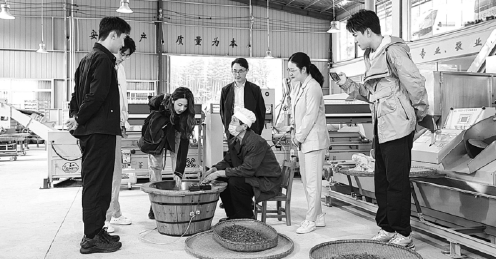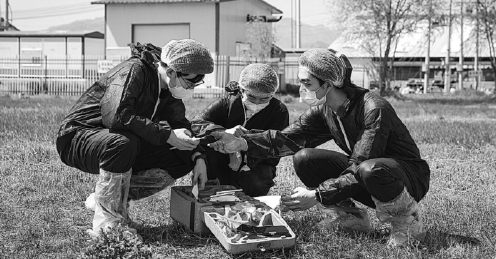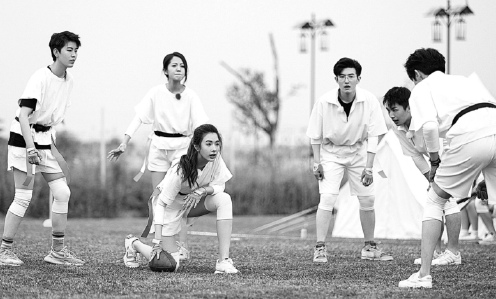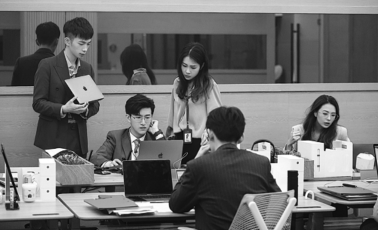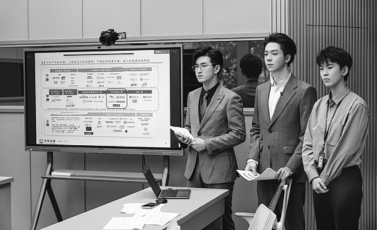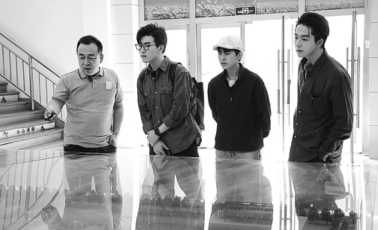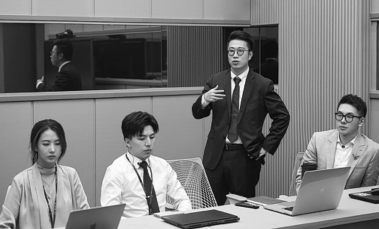Reality show to bank on
TV series where participants compete for their dream job returns for compelling new season, Li Yingxue reports.

Together with two other interns, He Bailiangge, 24, was on her first business trip.
It was a bit different from what He had expected. Instead of sitting smartly in a suit in front of a computer in an air-conditioned investment bank office, she and her teammates spent the day in a pasture under the blazing sun, in protective clothing, counting cows-dry cows, lactating cows and calves. There were thousands of them.
To help them in this arduous task, the trio used a drone to tally up the number of animals. By the time they had finished, they were covered in dirt, and the white shoes of Huang Huju, He's colleague, had turned an earthy yellow.
They were carrying out due diligence for a dairy company in Hohhot, Inner Mongolia autonomous region. Without the assistance of any experienced colleagues or mentors, the three interns were left to their own devices, but with good reason.
The excursion was one of the tasks in the second season of the reality show The Shining One, which premiered at the end of June on Jiangsu TV as well as on video streaming platforms iQiyi and Tencent Video.
The 20-episode show has followed nine Chinese job seekers, all in their 20s, as they battle to secure a dream job in the investment banking industry.
For over a month, the candidates interned at Huatai Securities, a leading integrated securities group in China, completing six tough tasks, both in groups and as individuals, in a bid to win one of three available spots.
As the first season of the show presented to the public what a securities company does and how it serves the economy, the second offers the audience a glimpse of one of the most coveted, yet hardest, roles: investment banking.
According to Bai Xue, producer of the show, when recruiting candidates for the first season, 80 percent of them said they wanted to work in investment banking.
Bai says their crew followed investment banking professionals at Huatai for months to observe and to learn about their work and responsibilities. They interviewed nearly a hundred of them, all different levels of seniority, to get a full picture of the industry.
"We want to make our show a guidebook for the workplace, so that the young people watching can see examples of some relevant workplace skills," Bai says.
A bank of information
"Investment banking is a booster for industry innovation, technological upgrade and the progressing of social values," says Jia Guangyu, one of the mentors in the show.
"It requires comprehensive capabilities, such as excellent communication and presentation skills."
The tasks in the show are the same as real work flow. The first task sees the competitors update a company prospectus, followed by other projects like industry research, pitch preparation and due diligence.
The last two group assignments are Initial Public Offering pricing and cross-border mergers and acquisitions, which evaluate interns based on the comprehensive skills needed in the industry, some of which are beyond their experience.
One of the highlights of the show is the three-level mentorship. It helps all the interns to rapidly grow under stressful and challenging conditions while attempting to complete their assignments, as well as showcasing how real-life investment banking professionals work at different seniority levels.
Mentors and coaches are two new roles that have been introduced to the second season in addition to the three senior supervisors, who have more than 10 years of work experience in the securities industry and are highly accomplished in their respective professional fields.
For the first four tasks, two mentors, Jia Guangyu and Xiao Jiasong, are assigned to help the candidates. The last two tasks are accomplished under the guidance of two coaches who are joined by two junior staff members who assist the interns. One of them is Lin Yinggu, an offer-winner from the previous season who has since switched his role from a student.
Jia thinks the show accurately represents the real lives of investment banking professionals and, in some cases, the tasks are even more intensive.
"As investment banking professionals, we are on business trips 90 percent of the time," Jia says.
"I hope this internship will help all the candidates learn more about the sector, and improve their capabilities in presentation and communication," she adds.
With a decade of experience, Jia started her career in investment banking as an intern.
Jia coached He and her two teammates Huang Huju and Wang Rui. During the due diligence task, Jia tutored them remotely and the trio's presentation was highly praised by the mentors. After each task, she led the team in reviewing their work to find out what could be done better during the next challenge.
With over a year's internship experience in investment banking, Wang Rui thinks the final task, the mergers and acquisitions, is the most challenging.
"It's one of the most difficult sections in investment banking and it requires negotiations between multiple parties,"Wang says.
The 24-year-old discovered an interest in the stock market during childhood and decided to pursue a career in investment banking when he finished his bachelor's degree in finance at Renmin University of China two years ago.
"I think investment banking is helping with China's technological development, and we can help a batch of excellent Chinese tech companies to grow, which gives me a sense of achievement," Wang says.
Five companies took part in the show as potential clients. Bai says the show is using the investment banking industry as a kaleidoscope for the audience to see the economic vitality and operational details of many industries in China, including digital new media, the consumer sector and healthcare.
Character of Generation Z
Su Junxin, 25, was an offer winner in season one who officially started his career at Huatai Innovation Investment in March, working as an analyst under Qin Qin's team. Qin was one of the four senior supervisors on the first season.
Su thinks besides gaining a job offer and peer friendship, joining the first season gave him a chance to learn more about himself from a different perspective. "When I looked back at the tasks I did, I saw certain things that I could have done better," he says.
Su says working full time feels quite different. "When I was an intern, I was tasked with helping others, while working full time brings more responsibility and ownership," he says.
After a successful first season, the second attracted tens of thousands of applications. Bai says they did five rounds of selection, from written examinations to face-to-face interviews, in order to nail down the final candidates. "The nine finalists are from a variety of backgrounds, as we want more young people to be seen instead of being judged purely on educational background," Bai says.
The background of the candidates is another highlight of the show, as the competition, cooperation and friendship between them showcase the characteristics of Generation Z.
"Unlike in a TV drama, where there are leading actors and supporting actors, in our show, each intern is the hero," Bai says, adding that each intern is representing a certain type of person, such as Liu Kunniang, who has a medical background, or Pan Junbin, who majored in actuarial science and statistics.
He Bailiangge graduated from Renmin University of China in June with a master's degree in modern Chinese history. During her bachelor study, she gained a dual degree in the history of the Communist Party of China and finance.
She recalled that, during most of her time as an undergraduate, she was working on over a dozen courses in two majors each semester. With a plan to join the finance industry, He started to look for internships in the field.
"I couldn't find an internship opportunity in investment banking, as my master major was not finance-related, so the show was a unique opportunity for me to meet my peers and get some finance-related experience at an excellent company," she says.
While competition with peers can sometimes crush a person, it can push others to excel.
He thinks that the level of stress on the show was much higher than at her previous internships, as the tasks were difficult and assigned to them at a hectic pace. With strong ability to adapt, however, she gradually found her confidence as the tasks progressed.
Jia has witnessed the personal growth of the interns during the internship."He's performance is beyond our expectation in each task and she impressed us so much. Wang Rui enhanced his leadership abilities, and he is going to grow into an elite investment banking professional," she notes.
Jia thinks that those born after 1995 are not afraid to express their opinions, and they are very active and passionate about all types of tasks at work. "Also, they are all versatile. As well as their professional skills, they can dance, rap and play musical instruments."
